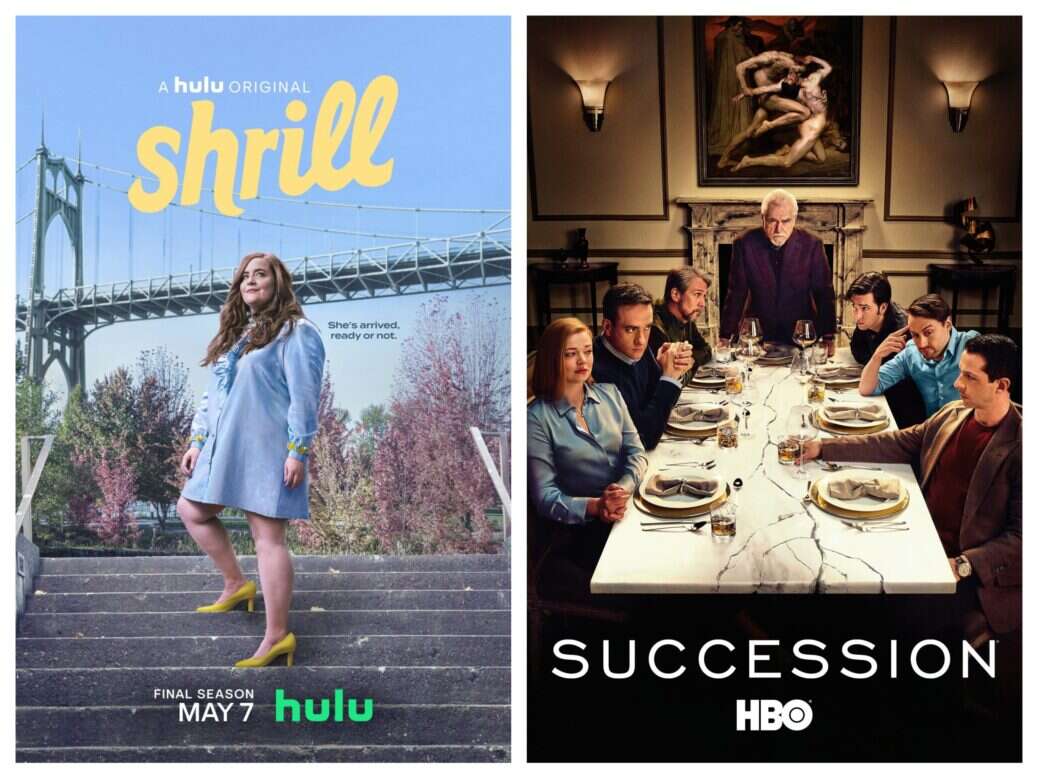
It’s been a brilliant few years for TV as Hollywood stars increasingly got involved with glossy HBO and Netflix series.
There are so many great series about newsrooms, which are (or were, pre-Covid) buzzing places filled with the whole spectrum of human emotion.
Then there are the journalists themselves who, let’s face it, are always great characters both on-screen and off. Even if a series is not about journalism per se, they often throw in a journalist character for this very reason.
Below we have collated a list of some of the best TV programmes about journalism and journalists spanning from the 1970s to the present day, using recommendations from Press Gazette staff and readers.
We’ve also included a set of honourable mentions where the series are not fundamentally about journalism but feature some memorable journalists and/or news plotlines.
See below for our full list of the best/memorable TV shows about journalism as ranked by their IMDB user ratings. If you have a glaring omission from this list you think Press Gazette readers need to know about, please get in touch via pged@pressgazette.co.uk and we can add-in.
Our previous culture lists:
Succession (HBO, 2018-present, 8.8)
Succession is a must for anyone who’s experienced the corporate side of journalism life – and anyone who’s ever wondered what might go on behind the scenes in the upper echelons of the Murdoch family, which still owns large chunks of the media industry in the UK, US and Australia. Created by Peep Show’s Jesse Armstrong it stars Brian Cox as the wily mogul and Alan Ruck, Jeremy Strong, Sarah Snook and Kieran Culkin as his children.
“The Logan Roy School of Journalism. What’s next, the Jack the Ripper Women’s Health Clinic?”
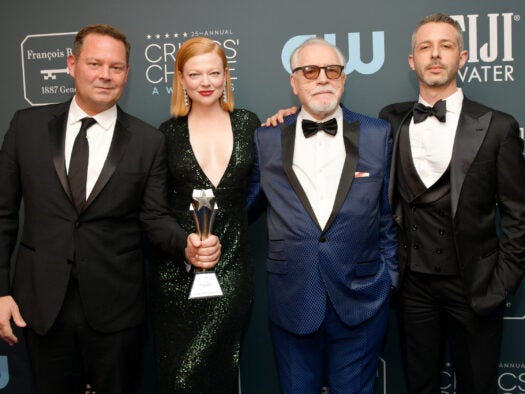
Winners of the Best Drama Series award for ‘Succession’ Kevin J. Messick, Sarah Snook, Brian Cox and Jeremy Strong at the 25th Annual Critics’ Choice Awards 2020. Picture: Matt Winkelmeyer/Getty Images for Critics Choice Association
The Newsroom (HBO, 2012-2014, 8.6)
Achingly cringe idealised view of TV news, or inspiring West Wing-style treatment of journalism. Your view may depend on which side of the Atlantic you live on. Starred Jeff Daniels and Emily Mortimer. Created by Aaron Sorkin and axed after three seasons.
“You know what, kiddo? In the old days… of about ten minutes ago… we did the news well. You know how? We just decided to.”
See also: Sorkin’s earlier Sports Night, going behind the scenes of a fictional sports news show. Often described as cancelled too soon after two seasons.
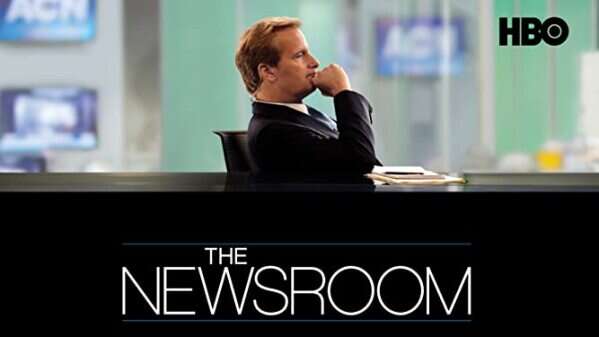
The Day Today (BBC Two, 1992, 8.6)
Chris Morris channelled Jeremy Paxman in this parody of current affairs programmes. Launched the Alan Partridge character in his guise as a sports presenter. Too many killer quotes to repeat here but this one, based on an urban myth involving a prominent news presenter from the 1980s, sticks in the memory:
“Fact me ’til I fart.”

Brass Eye (Channel 4, 1997, 2001, 8.6)
Chris Morris returned with a six-part spoof of investigative documentary series, and a one-off special about paedophiles in 2001. Duped numerous celebrities into recording absurd statements about whatever moral panic he was instigating.
“In Britain in the last century, it was quite acceptable for a gentleman to lose his virginity to one of London’s many whore dogs. Dickens and Prince Albert both boasted of their experience.”
After Life (Netflix, 2019-present, 8.4)
Ricky Gervais plays local journalist Tony Johnson who has all but given up on life after the death of his wife in this black comedy exploring grief. A feature writer at the fictional Tambury Gazette, Johnson is bored with filing quirky stories about the locals.
“Why would people rather be famous for being shit than not be famous at all?”
State of Play (BBC One, 2003, 8.4)
A newspaper investigates the death of a political researcher but the journalist realises his friendship with an MP, the woman’s employer, may be compromising the story. Starring John Simm, James McAvoy, Bill Nighy and David Morrissey, the series was later turned into a Washington DC-set movie starring Russell Crowe and Ben Affleck.
The Morning Show (Apple TV+, 2019-present, 8.3)
The Morning Show is the pinnacle of the glossy modern-day TV that has attracted Hollywood stars to defect to the small screen. It gives an unflinching look at the power dynamics and hierarchies of a major US morning news show plus the implications of the #MeToo movement on the newsroom. Starring pitch-perfect performances from Jennifer Aniston, Reese Witherspoon and Steve Carell.
“The truth matters. Sometimes it’s the only weapon that we have against the powerful men who are trying to shut us up.“
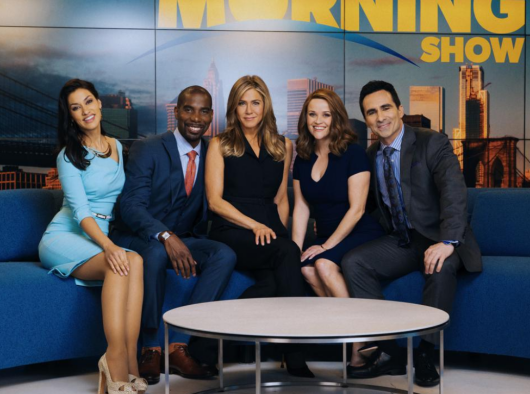
The Morning Show
Knowing Me Knowing You with Alan Partridge (BBC Two, 1994, 8.2)
The peak genius of talk-show host Alan Partridge insulting his guests. Written by Steve Coogan, Armando Iannucci and Patrick Marber.
“That’s not racist. French people chomp onions and go ‘hoh-hee-hoh-hee-hoh’, that’s a fact.”
The Mary Tyler Moore Show (CBS, 1970-1977, 8.2)
Mary Richards as a TV news producer without a husband or family in the 1970s made her a feminist icon and inspired countless female American journalists.
“If it weren’t for the rotten things that happen in this world we couldn’t put on the news show. We should be grateful to all the people who do those rotten things. We should stop them in the streets and say ‘Thank you Mr Mugger, thank you Mr Thief, thank you Mr Maniac.’“
See also: the more serious (and sometimes over-pious) spin-off Lou Grant, following the fired station manager who becomes editor of the Los Angeles Tribune.
Sharp Objects (HBO, 2018, 8.1)
Certainly not the most realistic depiction of journalistic life (there is a reason Amy Adams was described as the “world’s worst reporter” in Vulture) Sharp Objects is at least a fun vice for journalists to yell about her lack of note-taking and question-asking (which breaks up how bleak the rest of it is). Adapted from the book by Gillian Flynn, who also wrote Gone Girl.
“My demons are not remotely tackled.”
Press Gang (ITV, 1989-1993, 8.1)
Press Gang and the team at the Junior Gazette inspired a generation of journalists with its haphazard newsroom full of young reporters and some surprisingly gritty subjects for after-school telly. A great first run out for writer Steven Moffat, later of Doctor Who and Sherlock fame.
“I’m not being unreasonable, I’m keeping my cool. All I want is simply for this person to be removed from the studio and shot dead.”
Drop the Dead Donkey (Channel 4, 1990-1998, 8.0)
Set in the offices of Globelink News, it was recorded close to transmission to include topical references and showed a TV news channel racing downmarket in search of ratings. Featured Stephen Tompkinson and Neil Pearson.
“Over the last 25 years, I have read the news drunk, concussed, stoned, with a live stoat in my underpants and once on regional television with my trousers round my ankles and a Lithuanian prostitute under the news desk.”
The Hour (BBC Two, 2011-2012, 8.0)
BBC period drama with a muted pastel palette and not a little touch of noir. The Hour boasts an impressive British cast including Dominic West, Romola Garai and Ben Whishaw. It only ran for two short seasons (12 episodes in total), leaving viewers wanting more.
The Bold Type (Freeform, 2017-2021, 7.8)
The Bold Type follows three friends who work at the glossy women’s magazine Scarlet in New York with some millennial media themes: the Forbes 30 Under 30 list, stories about models abused by a photographer, and becoming a manager for the first time.
“Go in there with the confidence of an incredibly average white man.”
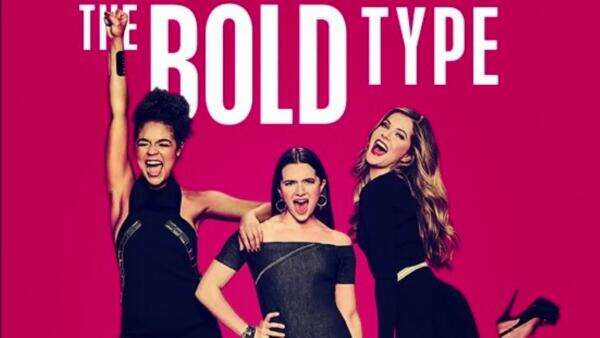
Hot Metal (ITV, 1986-1988, 7.8)
Dull and ailing newspaper the Daily Crucible is taken over by a business mogul who paves the way for staff to pivot into salacious tabloid gossip. The theme song ought to be revived in newsrooms across the UK, with its straight to the point messaging: “Papers [news, news], papers [news, news], give us your daily dues.
“Papers [news, news], papers [news, news], we’ll tell you what’s the news. Just buy your paper [news, news], paper [news, news], we’ll tell you what’s the news.” From the creators of sitcom Whoops Apocalypse.
W1A (BBC One, 2014-2017, 7.7)
Hugh Bonneville and Jessica Hynes returned as their fantastic Twenty Twelve characters to infiltrate the BBC’s tightrope-walking and tough cost decisions made through veiled corporate speak. Although not wholly centred around the newsroom itself, the BBC managers have to deal with issues like Newsnight being dubbed “Kneesnight” due to a female presenter’s “inappropriately watchable” attire and an unpredictable new subtitling system for BBC News.
“The thing with the BBC, in terms of branding is, it’s really boring. It’s politics, questions, investigations, Malala… whatever.”
The Newsreader (BBC iPlayer, 2022, 7.6)
For our money, The Newsreader is possibly the best portrayal of a broadcast newsroom that’s been on TV for a while.
For viewers like myself who were not around in the 1980s, it offers a fascinating glimpse into the stresses of reporting pre-internet plus a compelling combination of relationships behind the scenes and some of the biggest 1986 Australian and international news stories including the Challenger space shuttle disaster, Halley’s Comet, Aids, and Chernobyl.
Read our full review on Press Gazette here.
Press (BBC One, 2018, 7.5)
Newsrooms went primetime on BBC One in 2018 with rivals at a clear proxy for The Guardian butting heads with a red-top amalgam of the Sun and the Mirror. Although it was not exactly critically acclaimed and featured all manner of unrealistic moments, clunky intros and ugly front pages, it brought the industry together to enjoy (or enjoy hating) a modern-day depiction of our beloved profession.
[Read more: ‘Could that intro get any worse?’ journalists ask as they weigh in on first episode of BBC One drama Press]
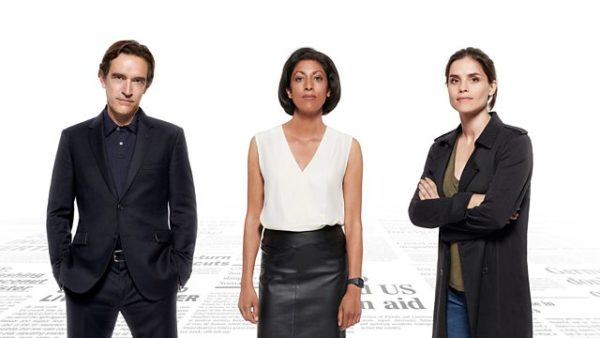
Priyanga Burford, left, and Charlotte Riley from Press. Picture: BBC
Shrill (Hulu, 2019-2021, 7.3)
Annie Easton works at an indie magazine in Portland, Oregon with the all-too-familiar rounds of cost-cutting and redundancies (all brutally done). It’s also easy to recognise the way she is forced to mine her own personal trauma and experiences, particularly around her weight, to get any recognition as a female journalist online.
“You’re a vital and tiny cog.”
Great News (NBC, 2017-2018, 7.0)
The 30 Rock of the TV news world (though not as successful at it). Setting aside the at-times irritating main plot of producer Katie’s mum becoming an intern on her show, there is some extremely fun story-chasing, focus on the way newsroom work can take over your life (and Christmases) and even a Goodfellas cameo.
“God, why can’t people just read [the news] themselves? That’s actually a really good idea! What if we printed out the news for everyone? And we organise it into sections, so you only read the stories you’re interested in. But how do we deliver it to everyone in the entire world? Teenagers on bikes!”
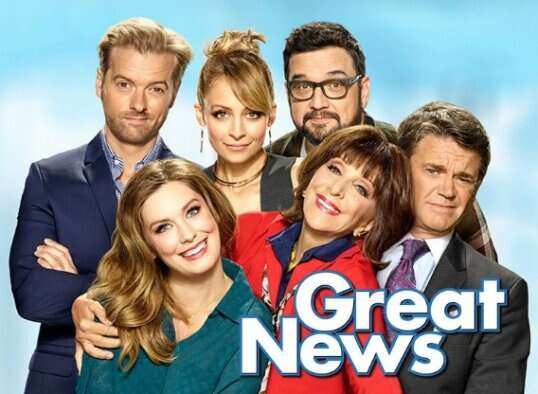
Lytton’s Diary (ITV, 1985-1986, 6.9)
Following the life of a newspaper gossip columnist, Lytton’s Diary is a fun portrayal of an 80s newsroom. His editor at the Daily News is dubbed “God”.
Ugly Betty (ABC, 2006-2010, 6.7)
Once one of the most-loved series on TV, now practically forgotten, Ugly Betty was The Devil Wears Prada for the small screen. This Vogue parody with ridiculous gossip and catwalk models everywhere is perfect, if silly, escapism.
“What’s wrong, Betty? Now that you’re a big fancy editor, you don’t even talk to the little people?” “Oh, I’m sorry, I couldn’t hear you over your loud shirt.”
Honourable mentions
Many TV series feature journalists without being such an integral part of the plot – here are a few worth remembering…
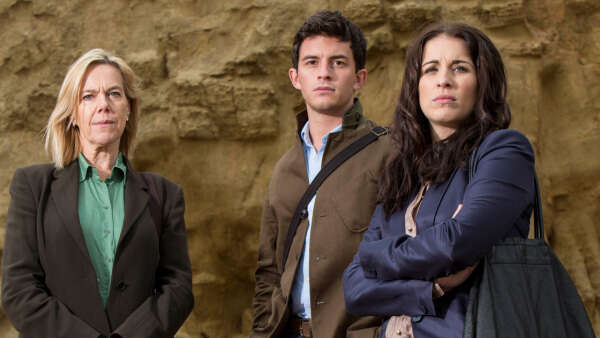
Three journalists in Broadchurch – two from the Broadchurch Echo and one national reporter
The Wire Season 5 (HBO, 2008, 9.3)
The Wire’s fifth season brought in a focus on a fictionalised version of Maryland’s largest newspaper, The Baltimore Sun. It is often ranked bottom of the show’s seasons but there is plenty for journalists to sink their teeth into.
The West Wing (NBC, 1999-2006, 8.9)
The West Wing wouldn’t be The West Wing without the White House Press Corps.
The Thick Of It (BBC Four, 2005-2012, 8.7)
Set primarily in the offices of certain ministers and their opposition, the media is an integral part of the Westminster powerplay in The Thick of It – as it is in real life. Highlights include every time Ollie (Chris Addison) is forced to contact his Evening Standard journalist ex-girlfriend Angela to try and place a positive story, plus the Spinners and Losers story which sees the Mail night desk rewrite their front page over and over.
Ted Lasso (Apple TV+, 2020-present, 8.8)
The press conferences at Richmond FC provide some of the most poignant moments of the series – and the funniest, from Trent Crimm, The Independent (as he helpfully introduces himself every time and eventually elicits a shout of “we know!”) Crimm also provides the focus for the third episode of the first season, profiling new coach Lasso and eventually reluctantly accepting his value to the team.
House of Cards (BBC, 1990, 8.5 + Netflix, 2013-2018, 8.7)
Similar to The Thick of It, the relationship between journalists and politicians plays an integral role. The US version notably features ambitious young reporter Zoe who comes to an arrangement with Frank Underwood (played by Kevin Spacey, the sexual misconduct allegations against whom you will have to ignore to fully enjoy the series).
Broadchurch (ITV, 2013-2017, 8.4)
The media frenzy is crucial to the plot of Broadchurch and both local and national newspapers – including the Broadchurch Echo and Daily Herald – play a part.
Gilmore Girls (WB/CW, 2000-2007, 8.2)
Rory dabbled in student journalism, and eventually became the editor of her college paper the Yale Daily News – despite being told at the end of a newspaper internship that she didn’t have what it takes to be a journalist. At the end of the series she gets a job as a reporter for an online magazine and, in the 2016 revival, is making her way as a freelance.
Smallville (WB/CW, 2001-2011, 7.5)
No article about on-screen journalists would be complete without Clark Kent and Lois Lane at the Daily Planet, where Superman starts working in the eighth season of this coming-of-age series for the superhero.
Shoestring (BBC One, 1979-1980, 7.5)
A phone-in radio DJ solves listeners’ cases. Slower in style than many others on this list, Shoestring may remind some of the good ol’ days (and make you think of an early Alan Partridge if he had more of an investigative brain).
Sex And The City (HBO, 1998-2004, 7.2)
Sex And The City left an entire generation of millennials wondering how on earth Carrie (Sarah Jessica Parker) could afford to live alone in New York’s Upper East Side on a freelance journalist’s salary.
More TV depictions of journalism nominated by readers (23/8/21 update)
Harry (BBC1, 1993-95)
Michael Elphick starred as Harry Salter, the ruthless owner of a news agency in Darlington.
Novine – The Paper (2016)
Croation depiction of newsroom life is available on Netflix and comes highly recommended.
Dead Man Weds (ITV, 2016)
Dave Spikey and Johnny Vegas starred in this comedy depiction of life on local paper the Fogborrow Advertiser.
Nathan Barley (C4, 2005)
Prescient comedy depiction of the achingly trendy world of new media in London. Featured Julian Barret playing a jaded hack who finds himself adopted by the trendy digital media types he despises.
Press Gazette is hosting the Future of Media Technology Conference. For more information, visit NSMG.live
Email pged@pressgazette.co.uk to point out mistakes, provide story tips or send in a letter for publication on our "Letters Page" blog
